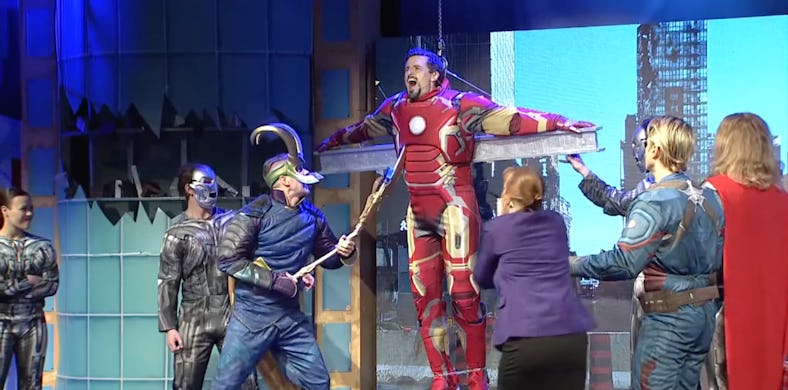We interviewed the pastor behind that Avengers church musical
“When Jesus came 2000 years ago, he did exactly the same thing,” Mark Hughes tells Inverse.

“I get knocked down, but I get up again, you’re never gonna keep me down.”
These are the immortal words of Chumbawamba and, according to a viral clip showing an Avengers-themed jukebox musical, also the words of Iron Man — who’s also a stand-in for Jesus Christ in a staged recreation of the climactic battle from 2012’s The Avengers.
What could have possibly motivated this bizarre performance? You may have noticed this clip recently if you’re plugged into a certain corner of TikTok or Twitter, but its origins date back to an Easter service in 2018 at the Church of the Rock in Winnipeg, Canada.
In light of The Avengers’ 10th anniversary on May 4, Inverse spoke to the pastor behind this and other pop culture sermons about why he finds the Avengers so biblically relevant, and why using pop culture in a religious context is more authentic than you think.
“When Jesus came 2000 years ago, he did exactly the same thing.”
According to pastor Mark Hughes, who leads this interdenominational and charismatic congregation, “The Avenger” (as he titled his Marvel-themed Easter sermon) is part of a long-running tradition.
“We do something pretty much every year and have been doing it for 20 years,” Hughes tells Inverse. “We use whatever is most popular in pop culture in a particular year. We always give it our own name and our own spin.”
In 2018, that happened to be the Avengers. The church has also done Joy Story, an Easter-fied Toy Story. After a two-year hiatus, Easter 2022 finally brought The Lion King of Judah to the stage.
But why pull from such mundane pop culture for one of the holiest days of the year?
“The simple answer is people, for the most part, today are not beating a path to their churches,” Hughes says. “They see them as archaic and irrelevant and outdated.”
The more complex reason goes beyond marketing.
“We're using pop culture as a metaphor to tell the biblical story,” Hughes says. “When Jesus came 2000 years ago, he did exactly the same thing.”
While modern culture is all about blockbusters and memes, in the biblical era everyone knew agriculture.
“Jesus used cultural metaphors in the form of sheep and goats and fig trees and wheat and corn and soil and seeds and vineyards and wineskin,” the Pastor says.
The Church of the Rock has just updated Easter using the language a contemporary audience understands: hit movies.
As Hughes wrote in a blog post archived by Bleeding Cool:
In The Wrath of Khan, it was Captain Kirk who died and rose again. The next year it was Captain Jack Saviour (Sparrow) in the Pirates of the Galilean. I appeared as the villain Captain Barabbas (Barbossa).
Last year it was Westley from the Princess Bride of Christ. I did a cameo as Miracle Max and if you are watching on television this Easter Sunday you will catch at least a snippet of my performance doing the memorable "he's only mostly dead" scene. One year I did my best impression of Michael Jackson in Robin of the Hood.
An image from Church of the Rock’s 2012 production, The Dark Night.
Hughes, who writes the scripts himself, notes in his sermon that there are biblical elements all throughout the Avengers movies, from Steve Rogers calling Thor and Loki “gods” to Ultron quoting scripture. When you boil them down, almost every superhero movie is a savior story. And if movies can pull from Biblical imagery, then churches can do the reverse.
Some academics argue that stories are told with a common template called the monomyth, an archetypal plot structure that’s applicable to everything from ancient mythology to Star Wars. Hughes, who cites monomyth popularizer Joseph Campbell as an influence, references a past play as a perfect example.
“We’re really trying to appeal to a very broad swath of people.”
“The Princess Bride is a beautiful classic of it because you actually have a literal death and resurrection of the hero character Wesley,” he says, “and it turns out he's only mostly dead, right?”
But when it comes to the music, that’s all the church.
“It's always a mashup of a bunch of stuff. We’re really trying to appeal to a very broad swath of people; young, old, everybody in-between.” Hughes says. “So when it's all said and done, they've all enjoyed things at their own level.”
Pastor Mark Hughes (left) in a publicity still for the 2018 Easter sermon.
Of course, it’s inevitable that whenever something goes viral, there’s a backlash. While most of the responses to the church’s clips have been positive or confused, there’s been some mockery too. Pastor Mark is turning the other cheek.
“I think people need to keep open minds,” he says. “It's really easy to criticize and mock things, but it's important to say, ‘Well, what, what are they trying to say?’ What we do is we take it and we tie it back to the original biblical story and we explain the true meaning of Easter and the true message of death and resurrection as per the fundamentals of Christianity.”
“We’re big people, we can take a little abuse.”
So is this the future of preaching? Probably not, but it’s certainly had the intended effect. If your sermon can get thousands of eyes on it, that’s a success even if some of the viewers are doubtful. In a message to his congregation, Pastor Mark spins the viral clip with a hopeful message: “Maybe people are going to hear the gospel for the first time in their life in a way they never thought they’d hear it before.”
“God’s going to use this,” he says. “We’re big people, we can take a little abuse. It’s all worthwhile if it’s for the cause of Christ.”